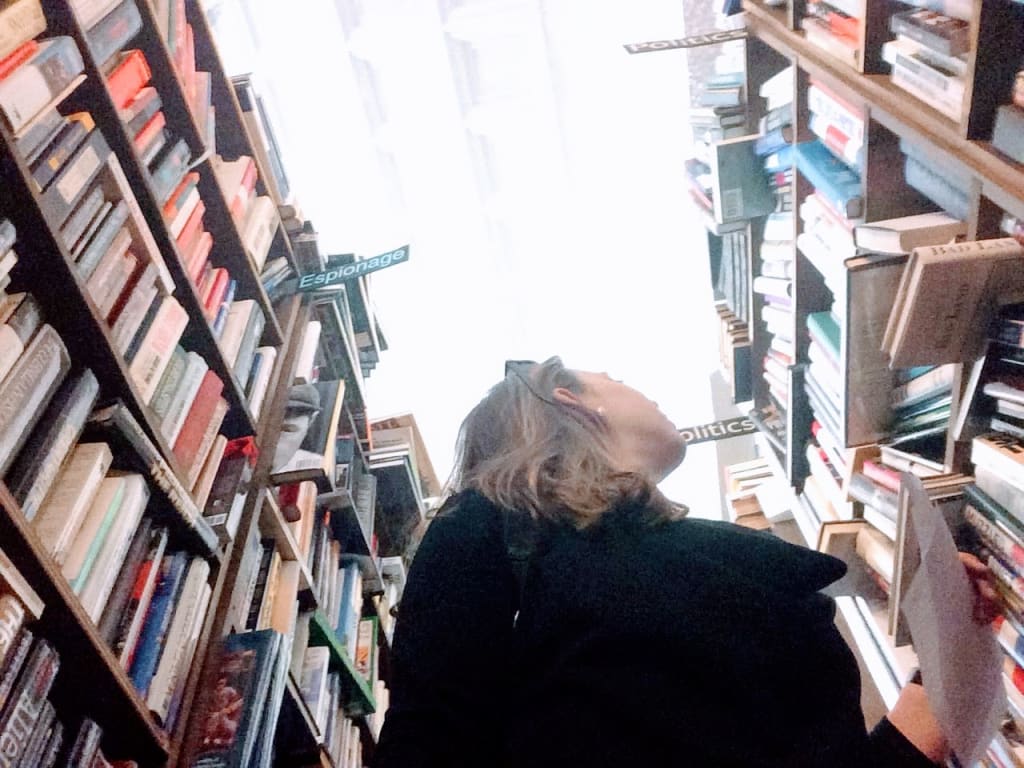Great Aunt Sarah's Library
She was "a nasty hoarder" and died of COVID. For $20,000, I was her executrix.

Everyone clicked their tongue in that disappointed way when my Great Aunt Sarah got sick with COVID-19 and died. It happened rather quickly; she was sick one day, in our small-town hospital the next and quietly buried without ceremony in a family plot by the end of the week. No one was able to go visit her in the hospital; a good excuse for a lot of people who probably wouldn’t have gone to visit her anyway. She was ninty years old.
Her death was rather convenient for me, I’m sorry to say. She had made me the executrix of her estate; the $20,000 executor fee and the task of managing her affairs allowed me to return to my rural hometown in Kentucky and leave the Chicago condo I’d been cohabitating (miserably) with my soon-to-be ex-husband. I wasn’t a logical choice for executor, but who was? Sarah never married and never had children; she never even left her childhood home. As all her siblings got married and had kids, and their kids had kids, Sarah got pushed farther and farther away from the nucleus of the family.
I took the task, the money, the free place to live and didn’t ask any questions.
My aunties warned me that Sarah was—and I quote—“a nasty hoarder.” Though I wouldn’t exactly use the word “nasty;” the old, family home did smell stale, as if the air had been trapped between the boxes and the wooden legs of dining room sets, unable to breathe for decades. Shelves heaved with books and trinkets, Christmas ornaments, still in their Hallmark boxes, were shoved in available space. At first, I was worried that if I dislodged one thing from its position of rest that the whole house would crumble around me.
The front room was a storage container of boxes and each box bore the name of a relative. It wasn’t until the second week of living in Aunt Sarah’s collection that I found a box with my name on it.
Along with cheesy school photographs and poorly colored pages I must have given her as a child, she had collected and saved nearly every print-publication that bore my by-line. My body seized at the sight of the collection: how had she even known about most of this? Aunt Sarah wasn’t someone to whom I regularly spoke. I wasn’t even sure my mother had regularly spoken to her. We saw her on high holidays sometimes, but the family had been forgetting to invite her more and more.
On top were issues of the business magazine that first hired me in Chicago; I wrote about how companies can retain top talent and educate their workforce. It was the first and the last print magazine for which I ever worked; all my subsequent by-lines have been online only. Under that were copies of the College Heights Herald. I spent my four years in university writing about the college experience through the eyes of my peers. I had felt so grown up and impactful then, like I was telling stories that really mattered. There were also the copies of my high school newspaper, where I wrote edgy opinion pieces about school lunch and the unfair dress-code, and the middle school monthly newsletter I wrote, edited (to the best of my ability) and handed out to my classmates.
I read through the collection, wincing at my misspelling and my ill-informed, juvenile passion. In high school, I’d politically been a Sarah Palin fan only to vote for Barack Obama four years later. I saw myself grow up in the record of my own words and I felt dismantled, as if I would crash onto the floor in pieces if I wasn’t wedged between all the stuff piled around me.
Aunt Sarah had craved neat path from the front door to the kitchen which was filled with full sets of plates, cups and bowls. It seemed Sarah had inherited every wedding set from those who passed before her, and she kept them neatly and safely stored on her kitchen counters, in her oven, in her cabinets.
I thought of my own wedding set and how my ex used to pester me into using it. “It’s too nice for everyday use,” I scolded with the impatience air of an adult speaking to a child. In the only usable corner of Aunt Sarah’s kitchen—which was home to a microwave and a coffee pot—I wondered for the first time why I hadn’t thought we were worth the extravagance of using nice things.
From the kitchen, another narrow path was carved amongst the things to a small bedroom which, thankfully, was rather tidy. The bed hung low in its brass frame and a large wooden table, easily a kitchen table, sat in front of a window that overlooked the back garden. On the floor next to her bed were precarious stacks of National Geographics, the oldest one I found was from 1939, about the time Sarah was eight.
The wall adjacent to the desk was lined with bookshelves and the bookshelves were filled with journals. The collection was comprised of different authors; the penmanship slanted at different angles, some even written in languages I couldn’t identify. When I saw them and realized what they were, I remembered the journal Sarah had given me for my eighth-grade graduation.
My parents had hosted a family get-together. I thought it was stupid; I was bashful and I didn’t think eighth-grade graduation warranted a celebration, but my grandmother made deviled eggs and my father was burning hotdogs just the way I liked them, so I smiled and let the day happen to me. Aunt Sarah arrived sometime between the first wave of hotdogs being ready and my cousin Brian knocking over and breaking an antique vase while chasing my brother around the living room.
I had all but forgotten the memory, but the journals brought it back in vivid details. Sarah had worn loose-fitting, light pink slacks, sensible shoes and a windbreaker zipped all the way up to her chin. She didn’t look like any great aunt I had ever seen.
“Hi Sugar!” she had cooed, reaching for me as if I would pull her into the house. She hugged me a few degrees tighter and a few moments longer than my fourteen-year-old-self liked, and then straighten. “I got you a little gift for graduation.”
“Oh, thank you, Aunt Sarah!” I said, taking the thin gift from her wrinkled hands. “I’ll put it in here with the other gifts.”
“Open it now. I want to watch you open it.” I looked around as if I didn’t want to be caught doing something I shouldn’t be doing. “Go on, for me,” she insisted.
I slipped my fingers underneath the crisp folds of the wrapping paper and revealed a slim, black, Moleskine notebook. It was smooth and firm in my hands. “A notebook,” I heard myself saying in a stale, inflected voice.
“Yes,” she smiled and touched my arm. “Edith Ebby, your seventh-grade English teacher, is in my knitting circle. She brings me those newsletters you write for the school, and she told me you were a beautiful poet. A proper writer needs a proper notebook. And this is the notebook geniuses have used: Hemingway and Bruce Chatwin.”
I knew the name “Hemingway” but hadn’t recognized the name of the famous travel writer, Bruce Chatwin, so I dumbly said, “I usually type on the computer.”
“Yes, and I used a typewriter when I was your age. But writing with pen and paper is something else entirely. It’s romantic and personal. When your heart has something it needs to say, well, a computer and a typewriter can’t quite make that connection.”
I didn’t know what else to say, so I just said thank you.
I hadn’t understood what she meant then; I didn’t really understand until after Aunt Sarah died and I spent my nights sitting at the big wooden desk in her bedroom, turning through those journals. Sometimes I read about people fighting with their parents, their children or their spouse; I read about people falling in love, about people wanting something, losing something. Other times I’d just turn the pages, slowly as if they would crumble in my hands if I didn’t take care, and I would run my fingers across the pages. The words were embossed below my touch, reaching up like brail, like a voice shouted into a canyon long ago. I wouldn’t need to read the words to feel the person who wrote them. I’d cry and laugh along with the writer without needing to see a word.
I was exhausted from sorting the house; from arguing with my ex; from writing dry financial pieces, seeing the pandemic hurt small businesses and individuals, but propel the worth of big brand companies that only paid blue-collar workers minimum wage; from the confusion, anger and fear the political landscape forced into what little mental space I had left.
In the journals, there would be throw-away lines about war or financial strain, about Richard Nixon or the Bush administrations. These tactile issues would burn hot and flash on the page and then ease into more ambiguous sentiments about truth, honesty and love. Love covered those pages like paint, and it reminded me of what Aunt Sarah had said to me so many years before: “It’s romantic and personal. When your heart has something it needs to say, well, a computer and a typewriter can’t quite make that connection.”
So on one bright Sunday in September, after my ex had yelled at me for missing a payment on the condo and my uncle made a snide comment about Blue Lives Matter on the weekly family zoom call, I opened the blank, black Moleskine journal I had purchased a week before, and I started to write everything I knew about Aunt Sarah.
About the Creator
Molly Koeneman (she / her)
Molly Koeneman is the author of travel essays. Since 2015, she has traveled to +25 countries across six continents while working Chicago office hours.
She reviews books as The Pithy Reviewer on Goodreads and Amazon.






Comments
There are no comments for this story
Be the first to respond and start the conversation.